Makeup and acne go hand in hand for many choosing the wrong cosmetic products or unknowingly using unsanitary methods to improve their appearance on a daily basis.
However, while makeup can undoubtedly be blamed for causing acne, it doesn’t mean you can’t find the right cosmetic product that won’t break you out or aggravate your current breakouts.
Therefore, in this article, I will tackle one of the biggest concerns of all makeup lovers and give my best tips and tricks on managing and even clearing acne without giving up makeup.
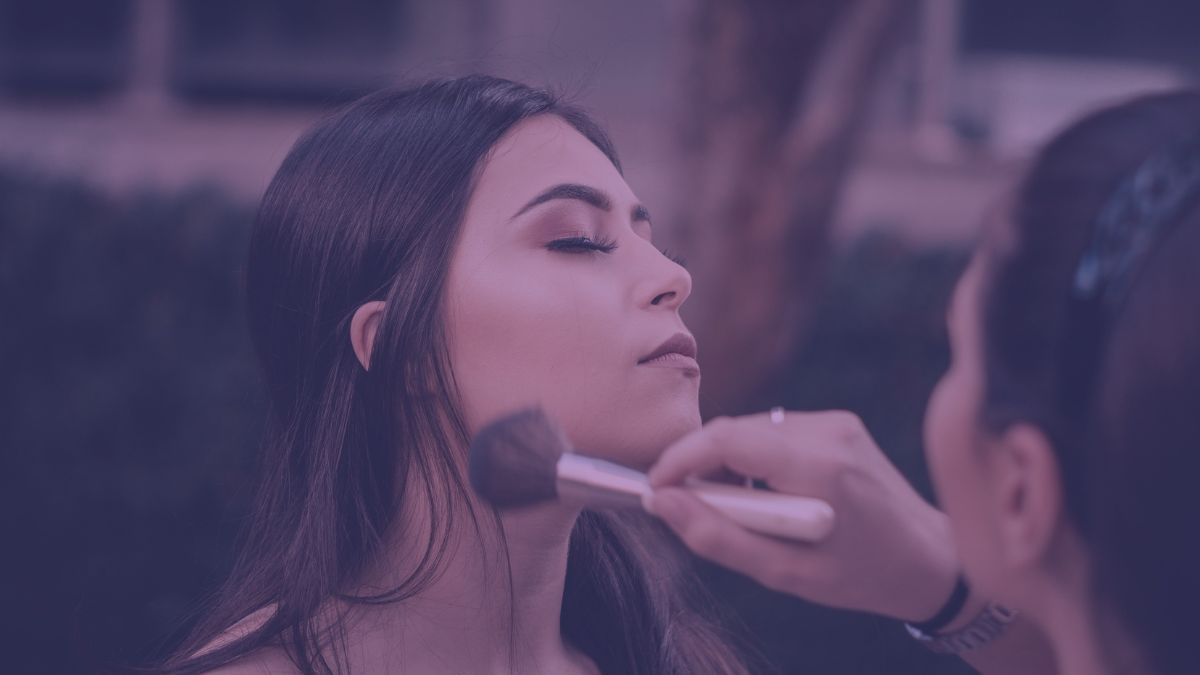
What Causes Acne?
Acne is a multifaceted skin condition resulting from four key contributors: excess oil and dead skin cells, overgrowth of bacteria, and inflammation.
First, the skin’s sebaceous glands may produce excess oil, which, instead of being released onto the skin’s surface, where it serves as a natural moisturizer, is trapped within the pores, where it hardens and forms a plug.
Second, skin cells, which should also be released onto the skin’s surface, where they form a barrier to keep moisture in the skin, clump up together with the oil, further blocking the pores.
The cellular debris that’s now clogging the pores attracts the third component of acne: bacteria, which thrive and multiply in the oxygen-free environment inside the blocked pore.
Lastly, the overgrowth of the bacteria will lead to the body’s immune response, triggering inflammation in the affected areas by sending white blood cells to fight off the overgrowth of bacteria.
This results in the skin swelling with pus and appearing red and raised on the outside, which we know as a pimple.
Can Makeup Cause Acne?
Yes, makeup affects acne in three main ways:
- clogging the pores,
- irritating the skin, and;
- encouraging bacterial overgrowth.
Let’s take a look at each one and how they can affect acne breakouts:
Makeup Can Clog the Pores
Many makeup products, such as foundations, concealers, and powders, contain oils, waxes, and other pore-clogging ingredients.
When applied to the skin, these products can mix with excess oil and dead skin cells, trapping them in the pores and leading to breakouts.
Makeup Can Irritate the Skin
Some makeup products also contain harsh chemicals or fragrances that can irritate the skin.
Irritation can result in inflammation, leading to new breakouts or preventing existing breakouts from healing, resulting in more severe acne.
Makeup Can Encourage Bacterial Overgrowth
By clogging the pores and causing irritation, makeup can create a favorable environment for bacterial overgrowth.
Additionally, using dirty tools with accumulated makeup can harbor pathogens that get transferred back onto the skin with each use, contributing to acne and more severe skin infections.
Ingredients in Makeup to Avoid if You Have Acne
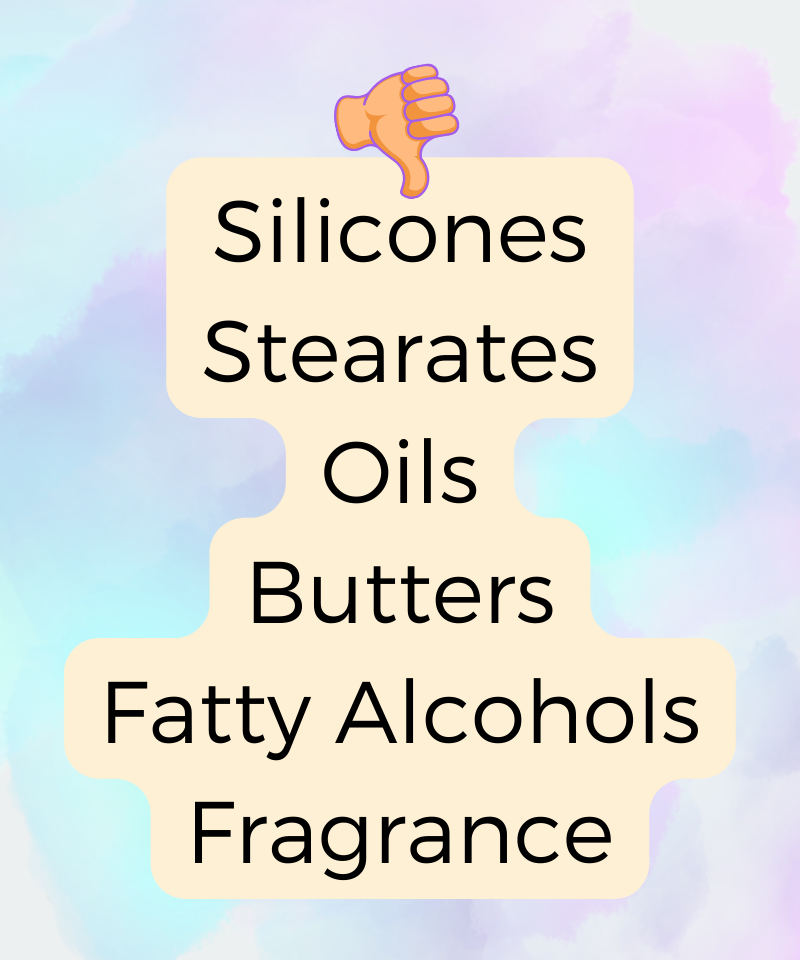
While every skin is different, and not everyone will react the same way to potentially triggering ingredients in makeup, some components are more likely to clog the pores and cause breakouts in those whose skin is already prone to experiencing this inflammatory condition.
Here are some ingredients in makeup that cause acne:
Silicones: These are common ingredients in makeup primers, foundations, and other complexion products. They create a smooth finish on the skin but can also trap oil and dead skin cells, leading to clogged pores and acne breakouts. Common silicones in makeup products include dimethicone, cyclomethicone, and cyclopentasiloxane.
Stearates: Stearates are components that moisturize and soften the skin. However, stearates can be comedogenic and cause acne breakouts. Common comedogenic stearates in makeup products include glyceryl stearate, butyl stearate, and stearic acid.
Emollients: Emollients are ingredients that make the skin feel soft and smooth. However, some emollients can be too heavy and can clog the pores. These include isopropyl myristate, isopropyl palmitate, and lanolin.
Oils: While oils are natural moisturizers, they can also clog pores and lead to acne breakouts. Common pore-clogging oils in makeup products include sunflower seed, palm, and wheat germ oil.
Butters: Similar to oils, butters can also trap oil and dead skin cells in the pores, leading to acne breakouts. Popular butter ingredients in makeup products include cocoa butter and mango butter.
Fatty Alcohols: Fatty alcohols are commonly used as emollients in makeup products, but they can also be comedogenic and cause acne breakouts. Look out for ingredients such as cetyl and cetearyl alcohol, stearyl alcohol, and lauryl alcohol.
Fragrance: Fragrances are complex combinations of natural or synthetically made substances comprising up to 50 chemicals. Some of these can irritate the skin, exacerbating inflammatory conditions such as acne and delaying skin healing.
How to Manage Acne (While Wearing Makeup)
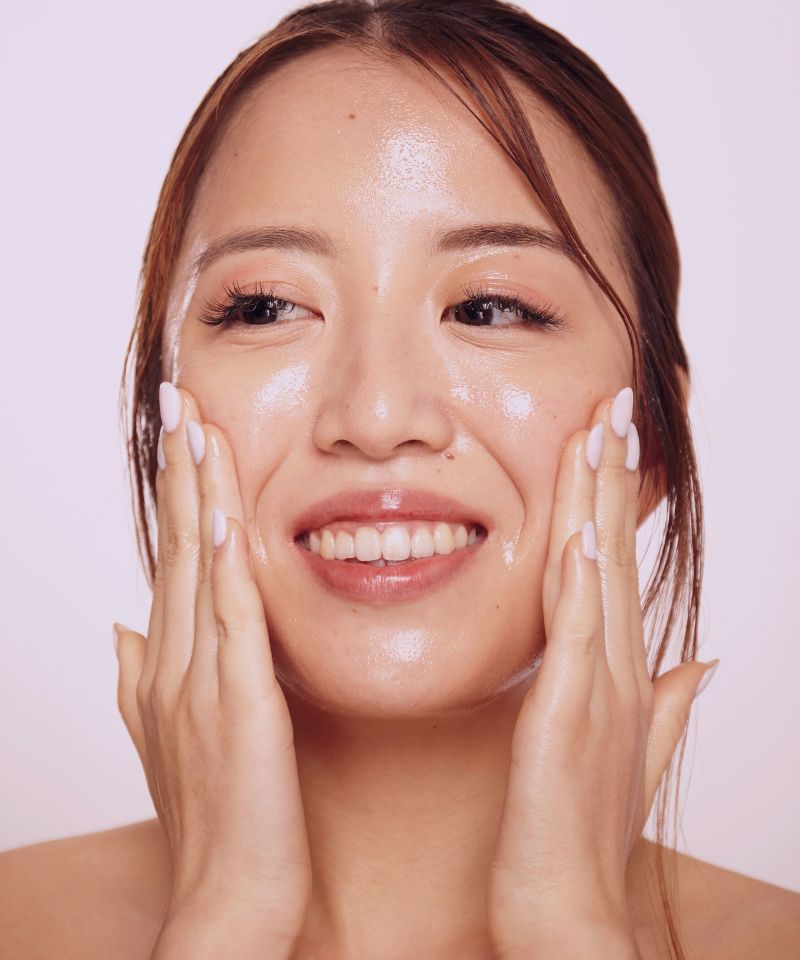
Dealing with acne doesn’t automatically mean you must abandon wearing makeup.
This condition can be managed by choosing the right products and following a proper skincare routine.
Here are some tips for managing acne while wearing makeup:
Have a Complete Skincare Routine
A complete skincare regimen will keep your skin clear and prevent the accumulation of acne-causing cellular debris.
Here are a few essential skincare steps to incorporate into your daily regimen for clear skin:
Cleanser: Wash your face twice daily with a gentle, non-comedogenic cleanser. This will remove excess oil, dead skin cells, and makeup residue and prevent the clogging of pores that leads to acne.
AHA/BHA: Consider using products with alpha-hydroxy acids (AHA) or beta-hydroxy acids (BHA). These chemical exfoliants unclog pores by dissolving cellular debris and preventing breakouts down the line.
Retinoid: If your skin is not sensitive, consider using a retinoid instead of an AHA/BHA. Retinoids increase cellular turnover and regulate oil production, which will prevent clogging of pores and acne breakouts.
Moisturizer: A light, non-comedogenic moisturizer keeps the skin hydrated, regulating oil production and preventing the clogging of pores.
Sunscreen: High SPF sunscreen protects the skin from UV rays, which can cause inflammation, exacerbate acne breakouts, and cause post-acne marks.
Use Non-Comedogenic Makeup Products
While finding a makeup product that’s completely free of comedogenic ingredients is almost impossible, considering the fact that every skin will react differently to every ingredient, you can decrease your chances of developing acne by opting for products with less pore-clogging potential.
Choose lightweight formulas, as these are less likely to trap oil and dead skin cells in your pores, and try to wear makeup products sparingly and remove them thoroughly before going to bed.
Keep Your Makeup Tools Clean
Makeup brushes, sponges, and other tools can harbor bacteria, oil, and dead skin cells.
This makes them a prime source for acne-causing pathogens that can transfer back onto your skin with each use.
To avoid this issue, make sure to clean your makeup tools regularly.
Use your facial cleanser to wash your brushes and other tools at least once every two weeks or once a week if you wear makeup daily.
Additionally, make sure to dry them by placing them in clean towels or paper towels to prevent the accumulation of dust and bacteria on their surfaces.
Wear Minimal Makeup
Wearing minimal makeup while dealing with acne can be painful, as many use makeup to hide their pimples and feel better about their skin.
However, the more products you apply to your skin, the more comedogenic ingredients you are exposed to, which means the potential of clogging your pores and causing acne breakouts is also increased.
Therefore, while your skin is healing, stick to a minimal makeup routine, using only the products you need.
This will also help simplify your makeup routine and make it more manageable while helping your skin heal and preventing breakouts down the line.
To minimize feeling bad about the current state of your skin, avoid triggering situations, such as staring at mirrors for a long time and hyper-focusing on your imperfections or comparing your skin to others, especially on social media, where images are often edited and do not reflect reality.
Additionally, remind yourself of your goals, as often in life, we have to sacrifice a current comfort to transform ourselves into a happier and healthier version in the future.
Don’t forget that by not wearing heavy makeup to cover your acne in the present, you are helping your skin heal and improve down the line.
Keep Your Skin Clean As Much As Possible
Managing acne while still wearing makeup is possible, but keeping your skin clean as much as you can is one way to help it clear up faster.
Therefore, avoid wearing makeup for long hours and try to remove it as soon as you get home from work instead of leaving it on until the evening.
Additionally, try to avoid applying makeup when you’re not going out or not attending important events and special occasions to give your skin some time to recover without being continuously irritated by makeup products and unnecessary cleansing, rubbing, and wiping.
Finally, take at least a day or two during the week to go completely makeup-free so your skin can regenerate without any external interference.
This will help manage your acne, and paired with a good skincare routine and the right makeup products, you can still wear makeup without worrying about experiencing breakouts later on.
Does Sleeping in Makeup Cause Acne?
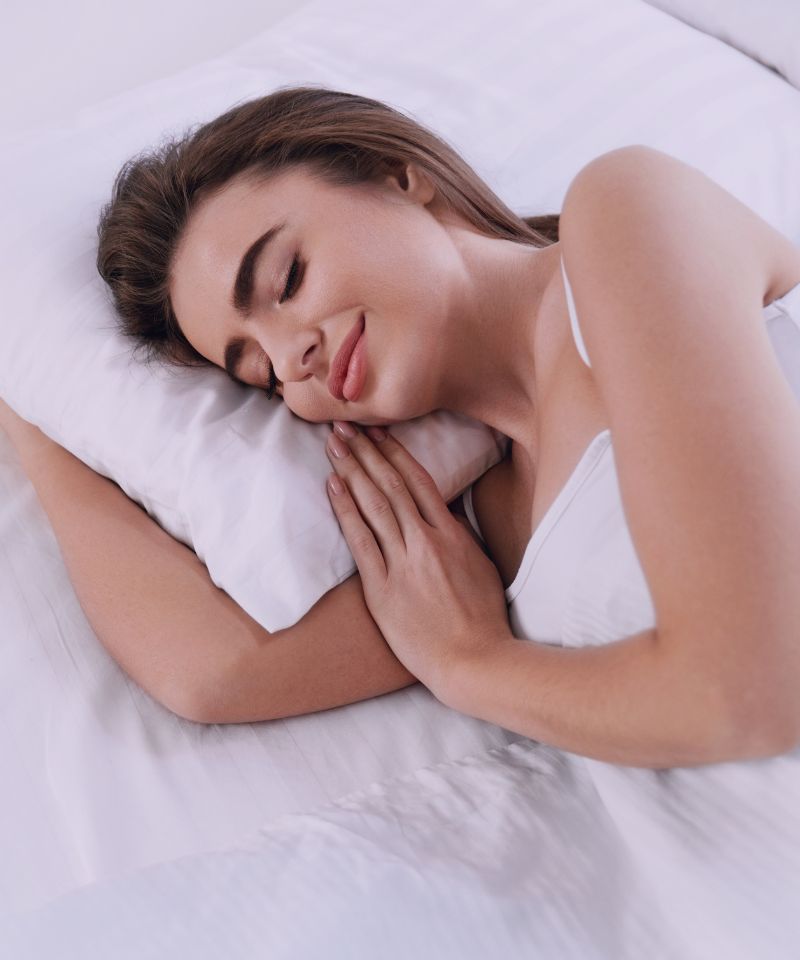
While sleeping with your makeup on the odd occasion is unlikely to cause long-lasting damage to your skin, making this a habit can result in potentially severe acne breakouts.
Each night you sleep in your makeup out of habit, your pores become more clogged, eventually forming microcomedones that will keep growing until they completely block your pore and become an infected, pustular pimple.
Moreover, sleeping in your makeup can result in unnecessary exposure to the free radicals in the environment, which the makeup holds onto.
Free radicals cause cellular damage, meaning your skin cells will have a harder time regenerating, which can lead to permanent concerns, such as a damaged skin barrier, dryness and irritation, and lines and wrinkles on the skin.
How Do You Know if Your Makeup is Causing Breakouts?
Identifying whether your makeup is causing breakouts can be somewhat tricky, but there are a few telltale signs to look out for.
Here’s how to know if your makeup is causing you to break out:
Check The Ingredients
The first step in determining whether your makeup products are causing you to break out is to review each one’s ingredients and make a list of the potentially comedogenic components it contains.
As already mentioned, everyone’s skin is different, and if your foundation contains an emollient, silicone, or oil, this isn’t an automatic red flag.
However, if multiple makeup products are packed with potentially comedogenic ingredients, they are more likely to be problematic.
The best thing to do in this situation is to eliminate these triggers until new breakouts stop.
Determine The Start of The Breakouts
The second thing to do is to figure out whether you recently introduced a new makeup product into your routine before or around the time the breakouts started.
This is easier if you already have clear skin, and the newest product you started using is the only variable that changed in your skincare routine.
However, it can be more complicated if your skin is already struggling with acne and you’re using multiple products at once.
In this case, try to eliminate one product at a time to see if the breakouts stop, and once they do, you’ve identified the culprit.
Pay Attention to Where Your Breakouts Are Most Prominent
Finally, pay attention to where your breakouts are occurring the most.
If they appear only on specific areas of your face, such as your forehead, cheeks, or chin, then this could be a sign that your makeup products are clogging those areas.
For example, your foundation may not be the problematic product; however, your concealer might be if you are only breaking out in areas where you use the concealer.
In this case, go back to checking the ingredient list and comparing similarities between the products to identify the culprit.
By paying close attention to these three factors, you can narrow your search and identify which of your makeup products might be causing your acne.
This can help you eliminate your triggers and avoid the potential culprits to prevent future breakouts.
Ready to take it a step further?
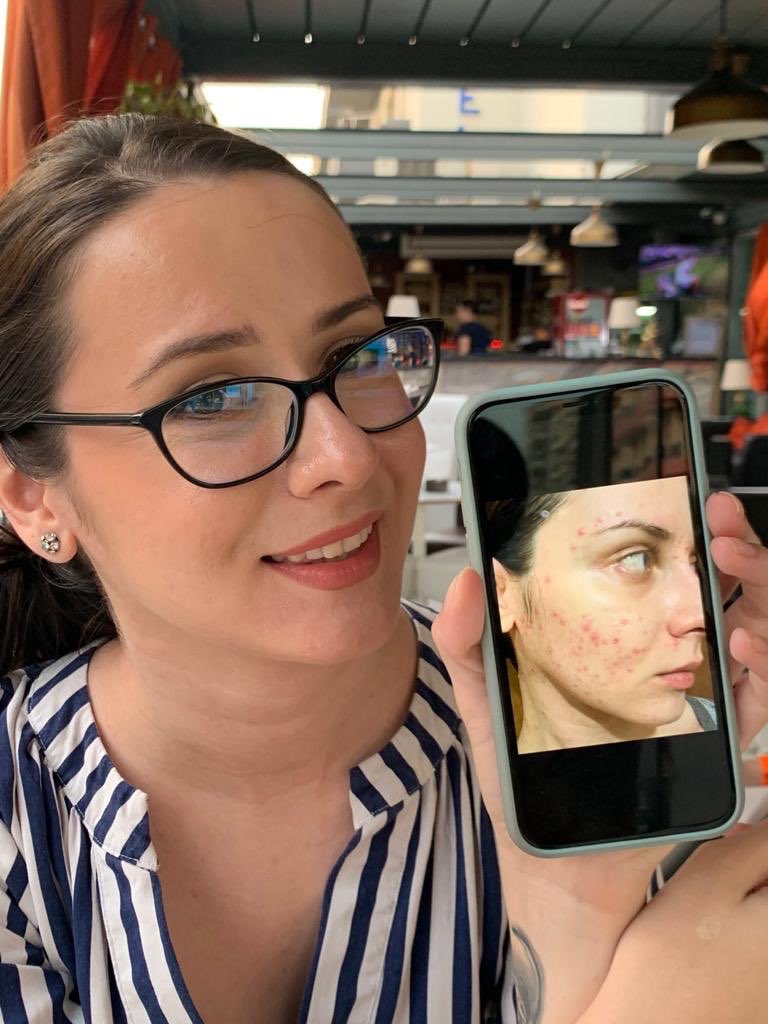
Struggling with acne and feeling overwhelmed by countless skincare routines that promise results but don’t deliver?
It’s time for a real change.
Introducing “The Acne Solution” – your comprehensive guide to understanding, managing, and ultimately conquering acne for good.
My course is more than just skincare; it’s a deep dive into the root causes of acne and a practical guide to achieving the clear, flawless complexion you’ve always wanted.
Whether you’re battling occasional breakouts or chronic acne, this course will guide you step-by-step through:
- Understanding the science of acne – what causes it and why
- Identifying triggers and how to avoid them
- Building a skincare routine that works for YOUR skin
- Selecting makeup that enhances rather than compromises your skin health
- Lifestyle changes that support clear skin from the inside out
Don’t let acne control your life any longer.
Enroll in “The Acne Solution” today and start your journey toward clear, confident skin.
Say goodbye to guesswork and hello to clarity. Your clear skin solution starts here.

My name is Simone and I am a certified skin specialist. I created this website to teach my readers how to take great care of their skin and I also like to occasionally share my honest opinions on skincare products I’ve tried. You can learn more about me here.
